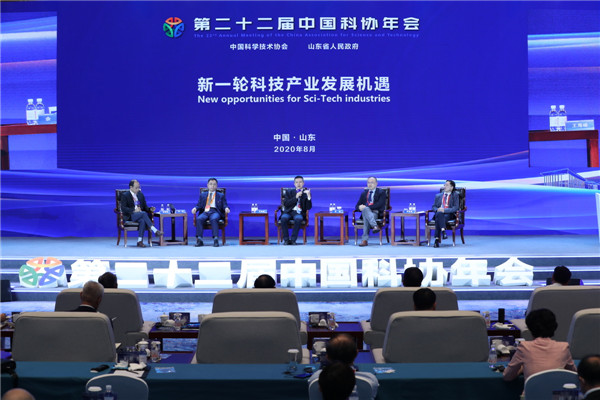Home> News
CAST head calls on science workers to drive high-quality development
Updated: 2020-08-17 (chinadaily.com.cn)

The annual meeting of the China Association of Science and Technology kicks off in Qingdao, Shandong province, on Aug 14, 2020. [Photo/chinadaily.com.cn]
Wan Gang, president of the China Association of Science and Technology, called on Chinese science workers to be determined in promoting innovation and strive to become the driving force for the country's high-quality development.
Wan made the remarks on Friday at the opening ceremony of the association's annual meeting in Qingdao, Shandong province.
The association has set up more than 30 online and offline activities in a wide range of cities, including Beijing and several cities in Shandong, featuring international scientific exchanges and cooperation, construction of maritime power, deep integration of technology and economy, public security and social governance, as well as scientific talent education.
Wan said a new wave of technological revolution is accelerating through sectors like new energy, new materials and artificial intelligence. These industries have already taken the lead in making breakthroughs, bringing with them major impacts on social progress, national security and economic development.
China still faces the arduous task of innovation-driven development and urgently needs the guidance and support of science and technology to achieve high-quality development with balanced scale, efficiency, safety and speed.
He said all science workers must persist in actively promoting the integrated development of technology and economy, digital economy and brick-and-mortar economy and seize opportunities to innovate.
He also urged science workers to carry out in-depth basic research, break through the bottleneck of core technologies, transform scientific achievements into actual productivity, improve their ability to solve practical problems and expand strategic emerging industries.
Wan said despite the COVID-19 pandemic hindering global science personnel exchanges, China will continue deepening cooperation and create a new pattern of domestic and international collaboration.
He said the association has opened convenient access and extensive online exchange platforms with many countries to ensure smooth personnel exchanges in trade, industry, science and technology, as well as education.
Since the COVID-19 outbreak began, the association has taken the initiative to strengthen communication and build platforms for joint efforts in fighting the pandemic.
It called on more than 170 scientific and technological journals to participate in the building of a paper database by the World Health Organization, worked with international scientific institutions in 69 countries and regions to promote science resources in Chinese and English and held a series of international seminars to share China's disease control experiences with more than 230 international organizations.
He said as China enters a normalized phase of COVID-19 prevention and control, the association will continue to integrate proactively into the international innovation network, give full play to the advantages of connectivity and long-term effectiveness of non-governmental scientific exchanges and promote open cooperation in the global scientific community.
"From a long-term perspective, the globalization of science and technology and the economy is still the advancing trend. We must strengthen our confidence and resolve in the concept of mutual trust to face our challenges and share innovation results to build a win-win partnership for the scientific communities of all countries in the world," he said.
Huai Jinpeng, Party secretary of the China Association for Science and Technology and an academician at the Chinese Academy of Sciences, said the annual meeting being held at a critical moment when the COVID-19 pandemic continues to spread across the world hopes to highlight the scientific communities' common values that trust, cooperation, development, openness and win-win are the catalysts to global scientific governance and the progress of human civilization.
More than 300 people attended the offline opening ceremonies, including academicians from the Chinese Academy of Sciences and Chinese Academy of Engineering, science workers, entrepreneurs and government officials, as well as experts and scholars from Japan, South Korea and Germany.
